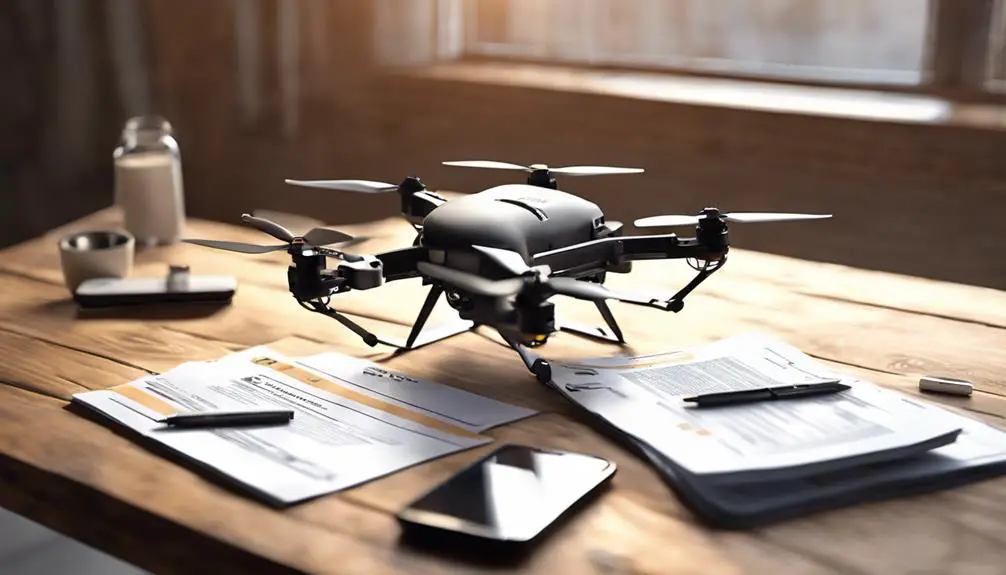Yes, you need to register your drone, especially if it weighs between 0.55 to 55 lbs or if it's used for commercial purposes. Registration helps you comply with legal requirements and avoid penalties. If your drone is a toy under 0.55 lbs, you're generally exempt. To register, you'll visit the FAA's website, provide your drone's details, and pay a small fee. Not registering can lead to fines, legal action, or even the confiscation of your equipment. Keeping your drone in compliance is essential for enjoyable flying, and you might discover more tips on staying legal and safe with your drone.
Understanding Drone Registration Laws
When it comes to flying your drone, understanding the registration laws is essential to avoid any legal issues. You might think that flying your drone gives you ultimate freedom, but not following the rules can lead to penalties. Each country has its own regulations, and in many places, if your drone weighs over a certain limit, you'll need to register it. This process often involves providing your contact information and adhering to safety guidelines. It's not just about compliance; it's about protecting your right to fly. By knowing these laws, you can enjoy your aerial adventures without the stress of unexpected fines or restrictions. So, take the time to familiarize yourself with the registration requirements to keep your freedom intact.
Types of Drones and Registration
Different types of drones have varying registration requirements, so it's important to know what category your drone falls into before hitting the skies. Understanding these categories can help you navigate the rules and guarantee you can fly freely without worry. Here's a quick breakdown:
- Toy Drones: Generally under 0.55 lbs; often don't require registration.
- Recreational Drones: Weighing between 0.55 to 55 lbs; usually need to be registered.
- Commercial Drones: Heavier drones used for business; definitely require registration.
- Racing Drones: Typically lightweight, but if they exceed certain limits, registration may apply.
Know your drone type, and enjoy the freedom of flying responsibly!
Registration Process Explained
How do you go about registering your drone to guarantee you comply with regulations? First, head to the FAA's website and create an account. You'll need to provide some basic information about yourself and your drone, including its weight and model. After that, pay the registration fee, which is usually pretty low. Once that's done, you'll receive a unique registration number that you must display on your drone. Don't forget to keep a copy of your registration with you when you fly. This process takes just a few minutes and assures you can enjoy your flying experience without worrying about legal issues. So, take a moment to register and keep your freedom intact!
Consequences of Not Registering
Failing to register your drone can lead to significant legal repercussions and fines. Ignoring the registration requirement isn't just a minor oversight; it can seriously limit your freedom to fly. Here's what you might face:
- Fines: You could be hit with hefty penalties for flying an unregistered drone.
- Legal Action: Authorities may take you to court, costing you time and money.
- Seizure of Equipment: Your drone could be confiscated by law enforcement.
- Increased Scrutiny: Unregistered drones attract unwanted attention from regulators.
Protect your freedom by keeping your drone registered. Don't let a simple mistake ground your passion!
Tips for Safe and Legal Flying
When flying your drone, it's crucial to follow safety guidelines and regulations to guarantee a smooth experience for everyone involved. First, always register your drone if it's required; it keeps you compliant and helps avoid fines. Stay aware of no-fly zones, especially around airports and crowded areas. Maintain visual line-of-sight with your drone, and avoid flying above 400 feet to uphold safety and legality. Respect people's privacy—don't intrude on private property or capture images without consent. Finally, keep an eye on the weather; flying in high winds or rain can lead to accidents. By sticking to these tips, you can enjoy the freedom of flight while keeping yourself and others safe. Happy flying!

